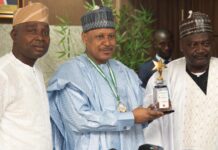
The Minister of State for Agriculture and Food Security, Sen. Dr. Aliyu Sabi Abdullahi, says the production of 31 Million MT of Grains in 2024 would combat food inflation, create jobs and reduce poverty as well as respond to President Bola Ahmed Tinubu’s emergency on food security.
The Minister stated this at the opening session of the 6th edition of Seed Connect Conference and Exhibition with the theme ‘’ Global Declaration of Food Emergency – The role of the seed industry and ensuring Africa’s Food and Nutrition Security’’. The two day conference ends today November 29, 2023 at the NAF Conference Centre, Abuja.
Sen Dr. Abdullahi stated that “the Nigeria’s seed requirement/need for 5 major crops of Rice, Maize, Wheat, Soyabeans and Sorghum in 2024 is 312,555.69MT of seeds which is expected to give almost 31million Mt of grains”.
The Minister revealed that “the Ministry has outlined series of critical pathways to solve the food security challenges. This pathways are streamlined into short term, intermediate and long term actions”.
He pointed out that “One immediate priority is the certification of available planting material for some food security crops in the dry season farming of 2023/2024 which we flagged-off in Jigawa state last Saturday, 25 November 2023”.
He stated that the ministry was targeting over 70,000Ha for wheat production under a facility support of the Africa Development Bank (AfDB) and National Agricultural Growth Scheme and AgroPocket Scheme (NAGS-AP) project.
He added that the farmers are being supported with quality seeds for rice, maize and soybean and other inputs at a subsidized rate.
He further said that “pasture seeds development, fodder and foliage estates that will gradually eliminate farmers and herders clashes, creation of gene banks facilities is also a short term intervention that the administration is pursuing”.
The Minister noted that “In terms of finance which is very critical, the take-off of the National Agricultural Development Fund to support production, critical agricultural infrastructure and provide financial leverage for farmers will also be focused on in the short term”.
According to him, “this will also be supported by reforms in the Bank of Agriculture and Nigeria Agricultural Insurance Corporation to meet the need of its clientele using digital solutions”.
He stated that the National Agricultural Seeds Council (NASC) would be refocused to increase sensitization, surveillance and enforcement of its laws toward curbing infiltration of uncertified seeds that rob farmers of their value for money.
He added that “the Nigeria Agricultural Seed Council (NASC) will be empowered to carry out its mandate through strategic reforms and budgeting attached to KPIs which is in line with the goal of the administration”.
In his welcome address, the Acting Director General, NASC, Dr. Ishiak Khalid, said that “this year’s event has been dedicated to the Global declaration of Food Emergency and the role of Africa’s Seed Sector in creating a sustainable food system to ensure access to nutritious and affordable food both now, and in the future”.
Dr. Khalid stated that NASC will also be convening a National seed planning to bring stakeholders to plan for the 2024 planting season and how to achieve the national seed requirement.
He added that “In terms of inclusivity, NASC is leveraging on the use of Licensed Seed inspectors to achieve low level certification in an efficient manner”.
He emphasized that “the target of Mr. President in making quality seed available to farmers is a drive the Seed Council is following through by deploying all arsenals for efficient seed certification, surveillance and mopping out adulterated seeds. Not leaving out building of industry capacity for especially with the NASC membership of the OECD”.
In his remarks, the Netherland’s Ambassador to Nigeria, Wouter Plomp, stated that “the Netherlands – Nigeria Seed Partnership – a model of collaboration built on knowledge exchange and mutual, has been instrumental in advancing Nigeria’s seed sector, fostering the exchange of expertise, technology and best practices”.
Present at the opening session were representative’s drawn from the Ministry’s Development Partners; United States Agency for International Development (USAID), Africa Agricultural Technology Foundation (AATF), Alliance for a Green Revolution in Africa (AGRA), World Bank, Syngenta Foundation, among others.
Ezeaja Ikemefuna
AD, Information
For: Director, Information




